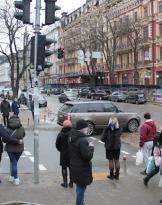In my business embedded with the Italian contingent of the NATO KFOR mission, I had the pleasure and honor of spending an entire day with the carabinieri of the MSU and touring with their patrols. It goes without saying that the experience was exquisite both from a human and a professional point of view.
Currently the contingent of MSU (Multinational Specialized Unit) stationed in Kosovo is stationed at the Pristina base dedicated exclusively to the carabinieri, commanded by Colonel Stefano Fedele.
The need to have a contingent of military police, following the NATO international missions, was hypothesized and realized for the first time in 1998 in Bosnia-Herzegovina, by General Wesley Clark, who imagined a police force with military status, following the military forces employed in the theater. This military police unit should also have played the dual role of civilian police, capable of relating between the military forces and the population. We could imagine it as a link between military and civilians.
The MSU in the operational theater provides the ability to carry out security operations, such as public order protection operations, collection and evaluation of information collected during normal patrol services.

In addition to the operational aspect, there is the ability to provide advice, training and support to local police forces on typical civil police activities such as: fight against organized crime and terrorism, investigations into war crimes, crime prevention and public safety . Within KFOR, of course, the mandate is dictated by UN Security Council Resolution 1244 of 1999 - to contribute to security and freedom of movement for all communities in Kosovo. The entire contingent of MSU is commanded by a police colonel who is also an advisor to the KFOR commander for police activities.
The unit is powered by the personnel of all the roles of the carabinieri coming mainly from the 7th "Trentino-Alto Adige" regiment, from the 13th "Friuli-Venezia Giulia" regiment, for particular operational tasks the unit can draw on highly specialized personnel from the 1st “Tuscania” parachute carabinieri regiment and also from Special Intervention Group (GIS). But the real strength is the origin of many carabinieri of the so-called "territorial", or those carabinieri who are in control of the territory at stations scattered throughout the Italian territory. This staff really gives an added value as they can provide a lot of experience to the units patrolling the Kosovar streets and carry out the tasks of proximity police with the local population.
 In addition to all the mandate tasks, in Kosovo the carabinieri are in charge of the security of the city of Mitrovica. The city of Mitrovica develops on the banks of the Sitnica and Ibar rivers, the latter practically dividing it in two. To the south of the river lives the Kosovar Albanian community and to the north the Serbian community which has a parallel administration recognized by Belgrade but not by Pristina.
In addition to all the mandate tasks, in Kosovo the carabinieri are in charge of the security of the city of Mitrovica. The city of Mitrovica develops on the banks of the Sitnica and Ibar rivers, the latter practically dividing it in two. To the south of the river lives the Kosovar Albanian community and to the north the Serbian community which has a parallel administration recognized by Belgrade but not by Pristina.
Mitrovica is the administrative center of the district of the same name which borders the districts of Peja, Pristina and to the north with the Republic of Serbia. This makes Mitrovica a sparkling city from a political, administrative and cultural point of view. Due to the complexity of this city even today it is patrolled by the carabinieri with a particular focus: the bridge over the river Ibar closed to traffic and manned by the carabinieri 24 hours a day, to avoid any action that could give rise to disturbances of public order, as the bridge has a strong symbolic value.
In addition, the men of Colonel Fedele provide KFOR with a rate of personnel and means for anti-riot always in readiness H24 and 365 days a year. But there is not only the kinetic component but there is also the component of proximity to the population, in fact the contingent of carabinieri during the entire operational cycle in the area also engages in countless social and charitable activities in support of the vulnerable populations of the various ethnic groups present. in Kosovo.




Photo: author












